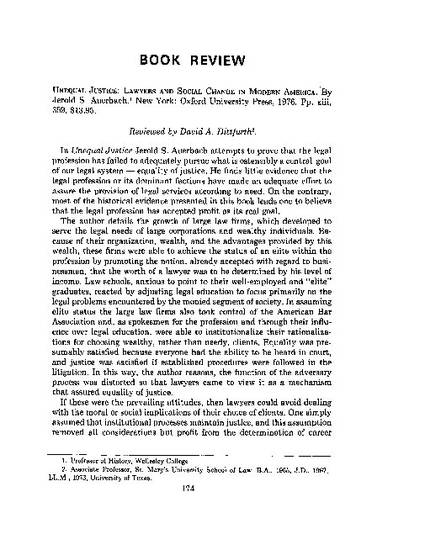
In Unequal Justice, Jerold S. Auerbach attempts to prove that the legal profession has failed to adequately pursue equality of justice. He finds little evidence that the legal profession or its dominant factions have made an adequate effort to assure the provision of legal services according to need. On the contrary, most of the historical evidence presented in this book leads one to believe that the legal profession has accepted profit as its real goal.
The author contends that, because the legal profession is responsible for formulating and applying law in a very legalistic society, it serves a very important societal function, and therefore must stand ready to resist periodic popular movements. Particularly, he believes the legal profession must stand against movements, such as “McCarthyism,” that are bent upon depriving “unpopular” citizens of their legal rights. Additionally, Auerbach asserts that lawyers must be ready to work for the realization of constitutional principles when society is ignoring or refusing to act upon existing deprivations, such as the civil rights movement of the sixties.
Auerbach insists that what is necessary is the correction of law, by lawyers and judges, so as to rapidly provide justice for minority groups. He assumes his liberal view of justice is the only valid one, and that the main hindrance to its immediate realization is the legalistic emphasis on “neutral” standards which masks a conservative preference for the status quo.
This assumption causes a serious weakness of the book. Auerbach would have judges making direct value choices without resort to legalisms, and wrongly argues the law must relax its adherence to the pursuit of neutral standards. Whatever the imperfections in the adherence to neutral standards, this obligation stands as the only force in law, independent of popular opinion, working toward clarification and realization of equal justice.
